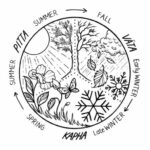 Eating for the Winter Season
Eating for the Winter Season
Here’s a long but wonderful blog; Introduction to Ayurveda: Winter Season Six Tastes & Eating for Dosha/Constitution. Weather and vegetation change around the sun and the seasons, so why shouldn’t we? Aligning diet and lifestyle with the seasons is a strong tool for boosting immunity and preventing illness.
Geographically the seasons come at different times, so observe the nature around you and apply the appropriate principles and practices.
All seasons hold different environmental qualities that mirror each of the doshas.
Because doshas naturally increases during different seasons, Ayurveda recommends a diet that balances those seasonal qualities.
“What you do today, sets the tone for tomorrow “
Winter
Winter is a season when the sun is at its lowest strength. The weather becomes cooler and the days are shorter. This is considered a Kapha time of year, which means the qualities of cold, damp and heavy are effecting us. This is a time to slow down, stay warm, get more rest and eat more nourishing foods. Foods should be warm and easy to digest and drinks should be warm to hot, with cold and raw foods and drinks being set aside for the summer season.
Because the digestive fire is stronger, all constitutions can enjoy slightly heavier foods, like stews.
The 6 Tastes and the Body:
Sweet
Promotes growth and strengthens all body tissues, stimulates salivation, improves circulation, promotes healthy skin and hair, strengthens the heart, relieves thirst and heartburn, increases milk production for mothers and acts as a demulcent, expectorant and mild laxative.
Examples of these are complex carbs, sweet fruits, grains, root vegetables, natural sugar, honey, milk, maple syrup, dates, cheeses, oils and meats
Sour
Stimulates acid secretions, helps digestion, reduces gas, increases circulation, energizes the body, increases salivation, stimulates appetite and sharpens the senses.
Examples of these are yogurt, limes, sour fruits, alcohol, vinegar, cheese, sour cream and fermented foods.
Salty
Makes food tasty, strengthen & improves digestion, maintains electrolyte balance, acts as a laxative, reduces stiffness, hardness & removes blockages, calms the nerves and spasms and helps in the elimination of wastes.
Examples of these are salts such as rock, sea, gypsum, black salts, seaweed and tamari.
Astringent
Constricts the blood vessels, decreases bleeding, promotes healing, acts as a diuretic, antibiotic, antibacterial, hemostatic and is constipating, drain and improves skin’s texture.
Examples of these are alum, the peel of a fruit, unripe banana, pomegranate peel, turmeric, golden seal, leafy green vegetables, blueberries, cranberries, beans, chickpeas and green beans.
Pungent
Improves metabolism, helps digestion and absorption, reduces congestion, improves circulation, relieves pain and muscle tension, works as an anticoagulant, cleanses mouth, raises body temperature, kills worms, promotes sweating, dries wounds and reduces excess fluids from the body.
Examples of these are jalapeños, ginger, black pepper, cloves, cayenne pepper, garlic, horse radish, garlic, onion and radish.
Bitter
Purifies blood, detoxifies body, works as an antibiotic, antiseptic, absorbs excess fat, oiliness, fluids, opens channels, reduces body temperature acts as a digestive tonic and liver tonic.
Examples of these are leafy vegetables, neem, aloe, golden seal, fenugreek, black tea, myrrh, bitter melon, coffee and sandalwood.
Eating Tips for Dosha
Vata
digestion tends to be irregular. Warm, cooked foods including sweet spices like cinnamon, cardamom and ginger help the Vata constitution absorb essential nutrients to keep them grounded and strong. Citrus also helps with digestion, while enhancing flavor.
Vata can be aggravated by excess amounts of Pungent, Sour & Salty.
Vata is decreased by balanced amounts of Sweet, Salty & Sour
Pitta
digestion tends to be strong, but in excess can be too acidic. Reduce sour tasting foods such as, vinegar, citrus, ferments, and alcohol. When Pitta’s digestive fire is high, raw foods can be balancing and cleansing. Avoid hot spices, esp. raw onion, garlic, peppers.
Pitta can be aggravated by excess amounts of Pungent, Sour & Salty.
Pitta is decreased by balanced amounts of Bitter, Sweet & Astringent
Kapha
digestion is slow, and can get sluggish. To boost digestive power, you can add spices like ginger, basil, turmeric or black pepper. Light, fresh foods are essential for Kapha, lightly steamed or warmed in a soup, to keep inner fires strong.
Kapha can be aggravated by excess amount of Sweet, Sour & Salty.
Kapha is decreased by balanced amounts of Pungent, Bitter and Astringent
Embodying Wellness
Danica Lynch is committed to teaching and educating individuals and communities how live happier, healthier and more balanced lives. As a Practitioner of Somatic Experiencing, Ayurveda and Somatic Yoga, Danica offers, practices and trainings.
Click here for Ayurveda and more Mindful Moment practices

Recent Comments